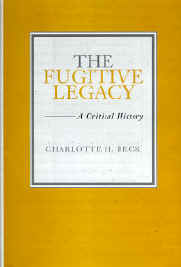The Fugitive Legacy
"The great value of this book lies at once in its range and its compression. Charlotte Beck demonstrates how the major figures among the Nashville Fugitives provided both an agenda and an arsenal for the poets and prose writers who came after them. She shows how Ransom, Tate, Davidson, and Warren supplied models for writers as diverse as Jarrell and Lowell, Porter and Taylor. This is a critical history that shows how a strongly held body of Southern thought and feeling could lead to a wonderful proliferation of gifts nourished by the same soil. Her book is dedicated to Cleanth Brooks, who would have applauded it." —Joseph Blotner, author of Robert Penn Warren: A Biography "The Fugitive Legacy is a crucial chapter in American cultural history, enjoyably readable from start to finish, and one that long needed to be written. Drawing on letters, anecdotes, and memoirs as well as primary materials, Beck traces relationships that are not only literary and intellectual, but also personal, social, and even on occasion erotic. Amid fine discussions of the poetic legatees, the treatment of Flannery O'Connor is especially perceptive as well as touching: perceptive about her Catholic affiliations with Tate and Lowell, touching about the modest responses of this physically ailing young genius to the admiration of her work shown by Warren and others." —R. W. B. Lewis, author of Edith Wharton: A Biography |
|
In The Fugitive Legacy, Charlotte H. Beck examines the extraordinary impact the Nashville Fugitives made as teachers, editors, and mentors of a younger generation in American letters. Previously, the critics, poets, and fiction writers who were protÈgÈs of John Crowe Ransom, Allen Tate, Donald Davidson, and Robert Penn Warren have received considerable scholarly attention only as individuals or in relation to small, close-knit groups of literary artists within single genres. Now, for the first time, this far-ranging group of accomplished writers is united as part of a larger phenomenon, the Fugitive legacy, which has extended its influence far beyond the parameters of southern literature. By 1937, most of the Fugitive group had left Vanderbilt and moved on to other locations where they continued, through teaching and editorships, to develop and encourage an ever-widening circle of writers. At least at the beginning of their careers, these young writers were shaped by the Fugitives' critical methods and aesthetic standards, and as they came into their own, these ideas became at least a point of departure for products of their maturity. Because their legacy is so extensive, Beck limits herself to renowned writers whose relationships with the Fugitives were demonstrably crucial to their success. After surveying the editorial legacy of the key Fugitives, she addresses their critical legacy and the major impact of Cleanth Brooks and the New Criticism. She next examines the extensive influence of the Fugitives on the poetry of Randall Jarrell, John Berryman, and Robert Lowell. Although the Fugitives themselves, with the exception of Robert Penn Warren, did not excel in the field of fiction, the largest section of the study deals with the Fugitive legacy in that genre, as Beck stresses the work of six writers——Andrew Lytle, Katherine Anne Porter, Caroline Gordon, Eudora Welty, Peter Taylor, and Flannery O'Connor. By treating the careers of these extraordinary authors as a single chapter in literary history, Beck makes an invaluable contribution to the understanding of southern literature. The cultural importance of the Fugitives has too often been confused with the narrow politics of Agrarianism and relegated to a reactionary piety for regionalism and dead tradition. The Fugitive Legacy fills a void in southern literary criticism by revealing the resounding echo of this group's voice in modern American literature. CHARLOTTE H. BECK, professor of English at Maryville College, is the author of Worlds and Lives: The Poetry of Randall Jarrell. |
 THE
THE